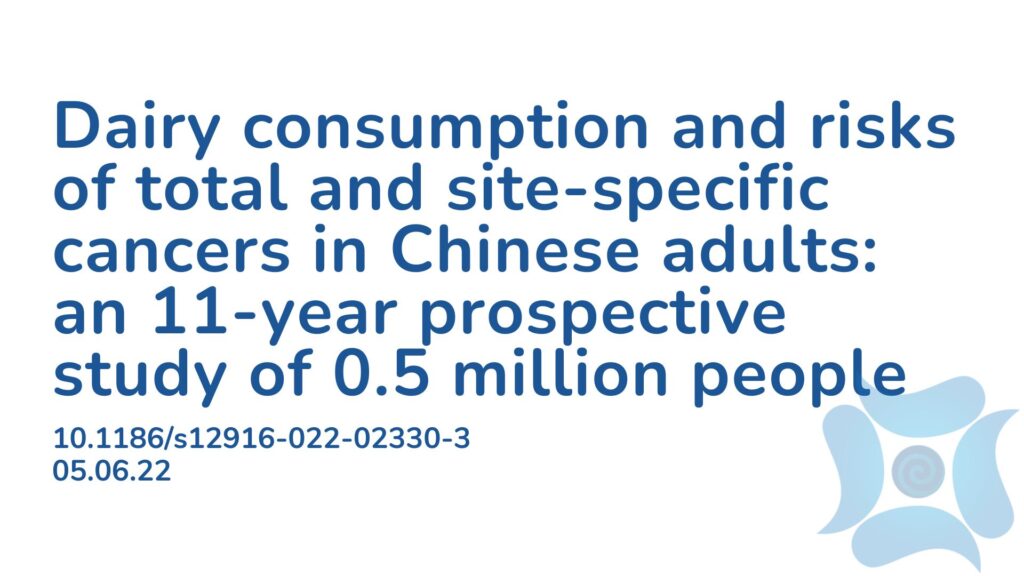Summary: In China, there are 3 million cancer deaths reported annually, with colorectal, lung, stomach, female breast and liver cancer being the most frequently diagnosed. It is well documented that major risk factors for cancer include smoking, chronic infection, alcohol consumption and, potentially, certain dietary factors including a low fibre diet and high intake of processed meat. The World Cancer Research Fund, based on the current available evidence, has concluded that although the evidence on dairy consumption and cancer is inconsistent, there is strong evidence supporting a probable protective role of dairy in the incidence of colorectal cancer, as well as limited evidence supporting the association of higher dairy intake and a higher prostate cancer risk. Despite these conclusions, most large prospective and meta-analysis studies have been done on western populations. Very few studies have been conducted in non-western populations where cancer rate, the type and amount of dairy consumption, and genetic influences on the metabolism of dairy products differ greatly from populations in western countries. This led the authors of this study to investigate the associations of habitual dairy consumption with cancer incidence in the China Kadoorie Biobank study, a large-scale nationwide prospective cohort study of Chinese adults. The results of this study showed that dairy consumption and cancer risk is very much associated with the amount of dairy consumed. Higher dairy intake was associated with higher risks of liver cancer, lymphoma and female breast cancer, and a positive association was shown between dairy intake and risk of total and site-specific cancers in China where the levels of dairy consumption are low. Future studies are needed to establish causality and any other contributing factors, as well as to ensure that evidence-based dietary recommendations can be made specifically for the Chinese population – as it seems a Chinese cohort’s risks for cancer differ greatly to those from western countries.
Abstract:
Background: Previous studies of primarily Western populations have reported contrasting associations of dairy consumption with certain cancers, including a positive association with prostate cancer and inverse associations with colorectal and premenopausal breast cancers. However, there are limited data from China where cancer rates and levels of dairy consumption differ importantly from those in Western populations.
Methods: The prospective China Kadoorie Biobank study recruited ~0.5 million adults from ten diverse (five urban, five rural) areas across China during 2004–2008. Consumption frequency of major food groups, including dairy products, was collected at baseline and subsequent resurveys, using a validated interviewer-administered laptop-based food frequency questionnaire. To quantify the linear association of dairy intake and cancer risk and to account for regression dilution bias, the mean usual consumption amount for each baseline group was estimated via combining the consumption level at both baseline and the second resurvey. During a mean follow-up of 10.8 (SD 2.0) years, 29,277 incident cancer cases were recorded among the 510,146 participants who were free of cancer at baseline. Cox regression analyses for incident cancers associated with usual dairy intake were stratified by age-at-risk, sex and region and adjusted for cancer family history, education, income, alcohol intake, smoking, physical activity, soy and fresh fruit intake, and body mass index.
Results: Overall, 20.4% of participants reported consuming dairy products (mainly milk) regularly (i.e. ≥1 day/week), with the estimated mean consumption of 80.8 g/day among regular consumers and of 37.9 g/day among all participants. There were significant positive associations of dairy consumption with risks of total and certain site-specific cancers, with adjusted HRs per 50 g/day usual consumption being 1.07 (95% CI 1.04–1.10), 1.12 (1.02–1.22), 1.19 (1.01–1.41) and 1.17 (1.07–1.29) for total cancer, liver cancer (n = 3191), female breast cancer (n = 2582) and lymphoma (n=915), respectively. However, the association with lymphoma was not statistically significant after correcting for multiple testing. No significant associations were observed for colorectal cancer (n = 3350, 1.08 [1.00–1.17]) or other site-specific cancers.
Conclusion: Among Chinese adults who had relatively lower dairy consumption than Western populations, higher dairy intake was associated with higher risks of liver cancer, female breast cancer and, possibly, lymphoma
Article Publication Date: 05.06.22
DOI: 10.1186/s12916-022-02330-3



